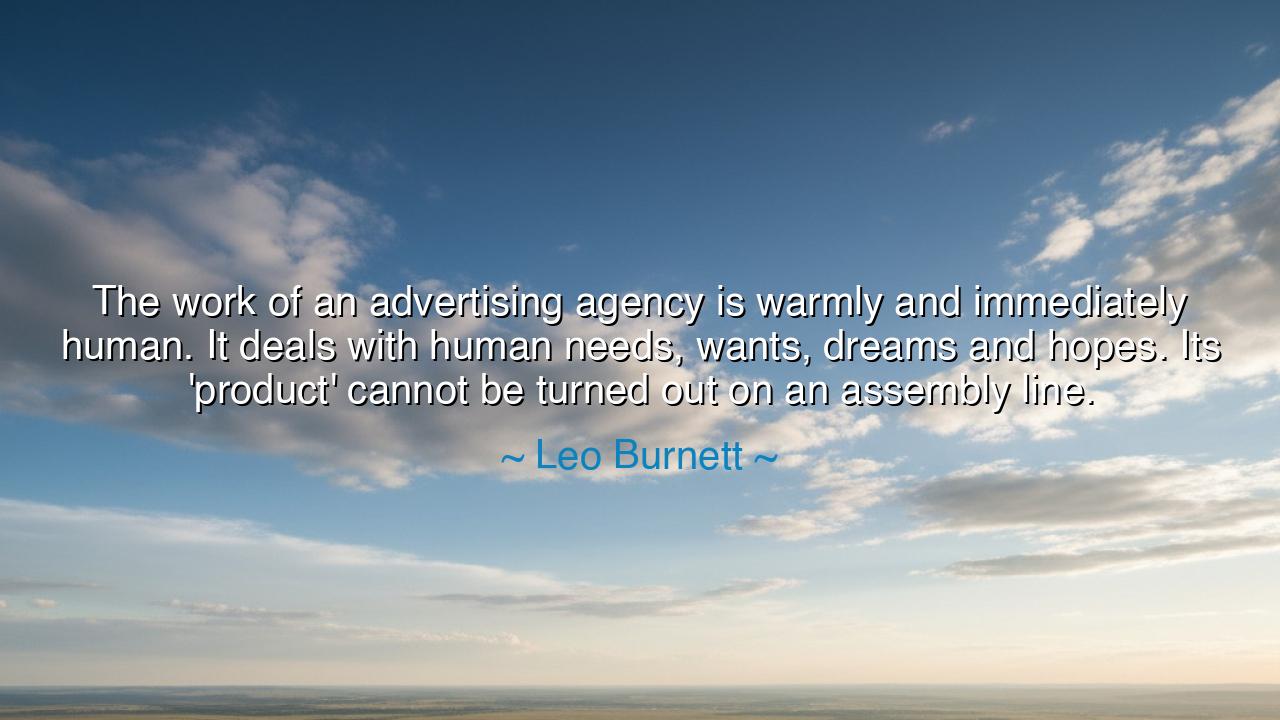
The work of an advertising agency is warmly and immediately
The work of an advertising agency is warmly and immediately human. It deals with human needs, wants, dreams and hopes. Its 'product' cannot be turned out on an assembly line.






In the wise and deeply human words of Leo Burnett, the master craftsman of modern advertising, we are reminded of the true heart behind every message that seeks to reach another soul: “The work of an advertising agency is warmly and immediately human. It deals with human needs, wants, dreams, and hopes. Its ‘product’ cannot be turned out on an assembly line.” This is no mere statement about commerce or marketing. It is a meditation on human connection — on the sacred exchange between those who create and those who are moved by what is created. Burnett, whose name stands among the giants of creative history, knew that true communication does not begin with machinery or money, but with the pulse of the human spirit.
The origin of this quote is rooted in Burnett’s philosophy of advertising — a philosophy that elevated it from manipulation to art, from persuasion to empathy. As the founder of the Leo Burnett Company in 1935, he entered an age when industry was booming, when the assembly line was the symbol of progress. Yet amid this age of mass production, Burnett dared to remind his peers that advertising could not — and must not — be reduced to mechanical process. For unlike machines, people are not built to consume lifeless messages. They yearn for meaning, identity, and emotion. Thus, he taught that the true work of an ad man was not to sell a product, but to speak to the human heart, to touch something universal within the chaos of modern life.
To say that advertising is “warmly and immediately human” is to say that it exists in the realm of feeling. Burnett believed that the most enduring brands — the most powerful ideas — are born from authentic emotion. Think of his own creations: Tony the Tiger’s spirited confidence, the Marlboro Man’s rugged independence, the Pillsbury Doughboy’s cheerful warmth. These were not mere symbols of commerce; they were reflections of human desires — strength, freedom, joy, comfort. Through them, Burnett proved that when an idea speaks to dreams and hopes, it transcends its origin and becomes something larger than itself. The product becomes not an object, but a story; not a transaction, but a relationship.
This truth reaches far beyond the world of advertising. It speaks to every craft where people seek to connect with others — teaching, art, politics, leadership, even friendship itself. The assembly line may produce identical things, but no machine can replicate the touch of sincerity, the spark of understanding, the echo of empathy. The human element is what transforms the ordinary into the memorable. As in the ancient workshops of the sculptors and poets, each act of creation must carry the imprint of the creator’s soul. Burnett’s wisdom is a call to remember that wherever there is creativity, there must be humanity — for only what is made with warmth can kindle warmth in others.
History offers us a mirror of this truth in the life of Michelangelo, who carved the divine from cold marble. When asked how he created his masterpieces, he said he simply removed what was not part of the angel. The same can be said of Burnett’s vision: that within every message lies a truth waiting to be freed — the truth of what people truly feel and desire. Michelangelo’s hands and Burnett’s mind served different arts, yet both drew from the same eternal source — human longing. Both understood that art and communication are acts of revelation, not assembly.
The lesson, therefore, is this: whatever your work, do not let it become mechanical. Whether you shape words, teach minds, heal wounds, or build dreams, remember that your task deals not with numbers or objects, but with living souls. The needs and hopes of others are sacred; approach them with reverence. If you wish to move hearts, you must first feel deeply yourself. If you wish to inspire trust, you must speak truth. The greatest creators, like Burnett, never forget that their audience is not a market but a family — people bound by the same joys and fears, yearning to be understood.
So, my child of purpose and creation, remember Leo Burnett’s wisdom. Let your work be a reflection of humanity — sincere, thoughtful, and alive. Do not chase the cold efficiency of the assembly line; instead, chase the warmth of understanding. Let every word you speak, every act you perform, carry a piece of your spirit within it. For the world does not hunger for perfection; it hungers for meaning. And when your craft, whatever it may be, springs from compassion and truth, it will not merely serve — it will endure, because it will have touched what is eternal in all of us: the human heart.






AAdministratorAdministrator
Welcome, honored guests. Please leave a comment, we will respond soon